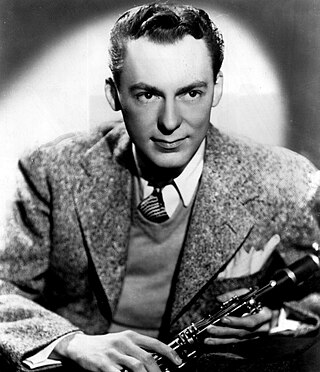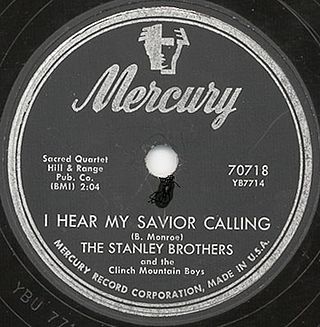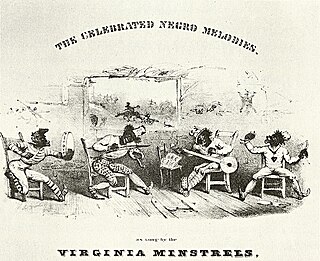
James Robert Wills was an American Western swing musician, songwriter, and bandleader. Considered by music authorities as the founder of Western swing, he was known widely as the King of Western Swing. He was also noted for punctuating his music with his trademark "ah-haa" calls.

Benjamin David Goodman was an American clarinetist and bandleader, known as the "King of Swing".

William Smith Monroe was an American mandolinist, singer, and songwriter, and created the bluegrass music genre. Because of this, he is often called the "Father of Bluegrass".

Woodrow Charles Herman was an American jazz clarinetist, saxophonist, singer, and big band leader. Leading groups called "The Herd", Herman came to prominence in the late 1930s and was active until his death in 1987. His bands often played music that was cutting edge and experimental; their recordings received numerous Grammy nominations.

The Stanley Brothers were an American bluegrass duo of singer-songwriters and musicians, made up of brothers Carter Stanley and Ralph Stanley. Ralph and Carter performed as The Stanley Brothers with their band, The Clinch Mountain Boys, from 1946 to 1966. Ralph kept the band name when he continued as a solo artist after Carter's death, from 1967 until his own death in 2016.

Albert Edwin Condon was an American jazz banjoist, guitarist, and bandleader. A leading figure in Chicago jazz, he also played piano and sang. He also owned a self-named night club in New York City.
"You Are My Sunshine" is an American standard of Old-time and Country music and one of the official state songs of Louisiana. Its original writer is disputed. According to the performance rights organization BMI, by the year 2000 the song had been recorded by over 350 artists and translated into 30 languages.

David Harrison Macon, known professionally as Uncle Dave Macon, was an American old-time banjo player, singer, songwriter, and comedian. Known as "The Dixie Dewdrop", Macon was known for his chin whiskers, plug hat, gold teeth, and gates-ajar collar; he gained regional fame as a vaudeville performer in the early 1920s before becoming the first star of the Grand Ole Opry in the latter half of the decade.

James Gideon "Gid" Tanner was an American old-time fiddler and one of the earliest stars of what would come to be known as country music. His band, the Skillet Lickers, was one of the most innovative and influential string bands of the 1920s and 1930s. Its most notable members were Clayton McMichen, Dan Hornsby (vocals), Riley Puckett and Robert Lee Sweat (guitar).

Hokum is a particular song type of American blues music—a song which uses extended analogies or euphemistic terms to make humorous, sexual innuendos. This trope goes back to early dirty blues recordings, enjoyed huge commercial success in the 1920s and 1930s, and is used from time to time in modern American blues and blues rock.
Richard Daniel Burnett was an American folk musician and songwriter from Kentucky.

James Robert Owen "Bob" Atcher was an American country musician.

Cléoma Falcon was an American guitarist and vocalist who, along with her husband Joe Falcon, recorded one of the first known examples of Cajun music. The recording, "Allons à Lafayette" was released in 1928, and opened the way for other commercial releases of Cajun music. Aside from being a ground-breaking recording artist, Cléoma Breaux also was one of the few women to perform live, despite the social standards of the era. She was the first woman inducted into the Cajun Music Hall of Fame.

Isaac Daniel (Dan) Hornsby was an American singer-songwriter, musician, recording artist, producer and arranger, studio engineer, band leader, artists and repertoire (A&R) man with Columbia Records, and radio personality.
Roy Cecil Harvey was an American old time guitar player, singer and songwriter. He was the guitarist with Charlie Poole and the North Carolina Ramblers and also recorded on his own, appearing on more than 200 records between 1926 and 1931.

"Goodbye, Little Darlin', Goodbye" is a 1939 song written by Gene Autry and Johnny Marvin. Autry sang it in the December 1939 movie South of the Border, and released it as a single in April 1940. It went on to make both Popular and Hillbilly (Country) listings for 1940.

Anton Lada was a ragtime, jazz and dance musician. He was a drummer. He played with and was the manager of the Louisiana Five. He recorded on Columbia Records and toured. Lada performed for dancing and vaudeville shows and made a series of recordings for Emerson Records, Edison Records, and Columbia Records.
"Freight Train Blues" is an early American hillbilly-style country music song written by John Lair. He wrote it for Red Foley, who recorded the song with the title "I Got the Freight Train Blues" in 1934. The tune was subsequently recorded by several musicians, with popular renditions by Roy Acuff in 1936 and 1947. Bob Dylan later adapted it for his self-titled debut album (1962).














